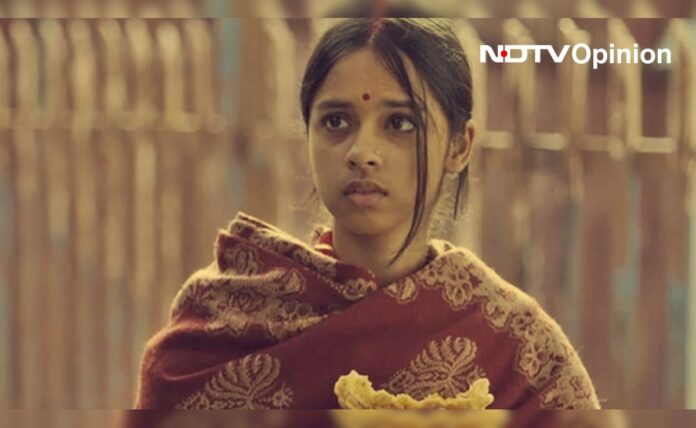
Getting shortlisted for an Oscar is a significant milestone for the well-crafted Laapataa Ladies from Aamir Khan Productions. It’s a delightful film, and we have yet to encounter anyone who has watched it and didn’t enjoy it. The theme is engaging, the songs are top-notch, and all the characters are developed with classic cinematic finesse.However, does it differ from other movies that reinforce prevalent stereotypes about Indian women? Are Indian women really as lachaar (helpless) as depicted? And are all those who aren’t lachaar automatically either cunning, scheming or bitter?First, let’s recap the movie. Set in rural India in 2001, it revolves around two brides: one so innocent that you feel pity for her, and the other an ambitious woman willing to go to great lengths to achieve her dreams. The ghoonghat-clad (veiled) women end up getting swapped on their way to their in-laws’ homes, sparking a chaotic bride hunt. Along the way, we encounter some interesting characters, both good and quirky.A lot has been said and written about Laapataa Ladies already. That the movie is a turning point for feminist cinema in India, that it challenges deep-seated patriarchy discerningly, with sophisticated simplicity. The movie is indeed a tour de force that changes a lot of things for women-led cinema in India. Even so, for days after we watched the film for the first time, the nagging feeling of being deceived stayed. That feeling perhaps stemmed from the abject simplicity of things itself.A Story Of ExtremesAll the female characters are portrayed as either extremely helpless or extremely astute. There is no middle ground. The strongest among them, the operator of a tea stall at a railway station, is fiercely independent and therefore has to be bitter and loveless. This aligns with a common trope in Indian films: strong women are often depicted as bitter, violent, scheming, or emotionless figures. Must a woman necessarily embody one of these traits to be seen as strong and independent?Then there’s a middle-aged woman who is entirely subservient and can’t even recall the last time she had a meal of her choice. Another character, the ‘jethani’ (the wife of the husband’s elder brother), has stopped talking or smiling since her husband went to the city to earn a living.There’s no denying that gender parity is a work in progress in India, as it is in many parts of the world. Systemic discrimination exists at all levels, from household to Parliament. However, a woman forever waiting for benevolence from others is a simplistic stereotype. And it’s one that aligns perfectly with the perceptions constructed over the years by colonisers, which unfortunately persist even decades after their departure. As Edward Said argued in his seminal work Orientalism, British and French imperialists perpetuated the notion that non-Western people were lazy, gullible, orthodox, unscientific, and driven by rigid dogmas. Non-Western women, in particular, were portrayed as helpless, ignorant, uneducated, servile, and dogmatic.Is Society So Easily Absolvable?The absolute simpleness of Laapata Ladies throws up other questions too. The experience of being a woman in India is not an ordinary one. Being heard as a woman, feeling safe as a woman, and being understood as a woman is a daily struggle. Most times, a woman, even if she wages these struggles, ends up being defeated by a society that refuses to change. Our contention then is with the dreamlike ease with which things just fall into place for Phool and Jaya once they decide to take fate into their own hands and to appeal to society’s conscience. Shyam Manohar, one of the most apt representations of India’s policing system, simply has a change of heart once he hears Jaya’s story. Jaya’s abusive husband, Pardeep, simply decides to back off when threatened. As for Phool, we couldn’t help but wonder what would become of her ‘ghoonghat’ and the newfound confidence that would require her to shun it, once she left Manju Maai’s motherly refuge and went back with Deepak to a society that is oblivious to her own recent transformation.Is women’s emancipation simply a matter of women’s self-growth then? Is the burden of change really so light, and must it be borne by women alone? Can society be absolved of its own guilt and wrongs so easily? Or, is society so incapable of change that a woman can be truly free only when she renounces it, like Manju Maai herself?Bridging The ExtremesDespite various levels of discrimination, we have a history of strong, independent women – who may or may not be like Manju Maai – who laid a solid foundation for the future. A Deloitte report points to some progress, noting a “gradual increase in the number of board seats held by women across India Inc.”, with women occupying 18.3% of board seats in 2023, up from 13.8% in 2018. The report further indicates that “all sectors examined in the survey showed an increase in the number of women on boards in 2023 compared to 2018”. Parallelly, it’s also true that roughly three out of every 10 women in India are illiterate.Naturally, we need dramatic improvements to bridge these two extremes. For that, India will need strong-willed women – not the helpless ones depicted in Laapataa Ladies – and an equally accountable society. (Mayank Mishra is Consulting Editor, Vasudha Venugopal is Anchor and Political Editor, and Harshita Mishra is Assistant Editor (Opeds), at NEWSWALLA)Disclaimer: These are the personal opinions of the author

